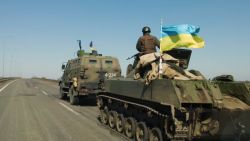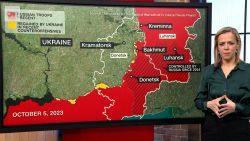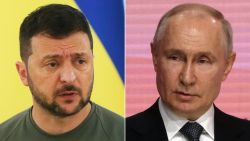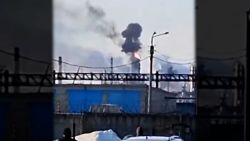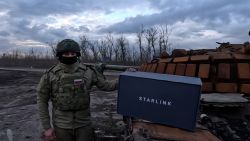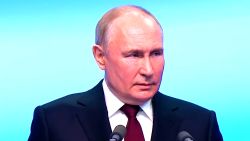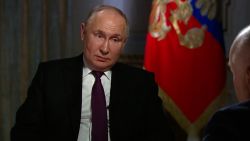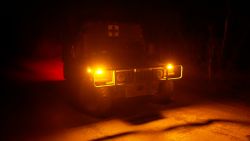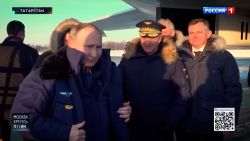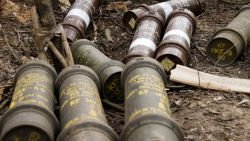This is the final bus out of the last position Ukraine holds on the road to Kherson – the first and only major city Russia has taken.
Villagers have standing room only, while the elderly have been rushed into a van. “Grandpa, we are here,” shouts the daughter of one local, Viktor, from the bus doorway, as he sits a little bewildered in the van. The panic is real; at any moment the shelling could resume, a bombardment that residents say has littered the southern Ukrainian village of Posad-Pokrovske with cluster munitions.
As the convoy of two vehicles hits the pockmarked road out toward the city of Mykolaiv, shells once again tar the horizon with a plume of black smoke. Sat in the back of the van, Vitali breaks down, using his grimy, orange workman’s gloves to wipe tears from his eyes.
“Civilians! They killed all the people, these are bastards, these are reptiles, parasites,” he says. “They don’t fight troops, they fight people. Do you understand? Kill everyone. Worse than the fascists.”
Next to him sits Viktor, who remembers the last time a war of this ferocity came to this part of Europe. “Of course I remember,” he says quietly. “I saw how the Germans attacked us. They didn’t bully people.”

Airstrikes, grad rockets, cluster munitions – the residents recall two weeks of intense bombardment to which the fabric of Posad-Pokrovske bears witness. Barely a building is unscathed, with most roofs missing, and one house is torn down to shreds of cloth. The village’s gas main has burst, with the intense hissing of a leak a stark reminder that the tiny settlement is no longer fit for life.
The village school has had an entire wall torn off it, stairs that once brimmed with children now echo with a ghostly crunch, as broken glass is trampled underfoot. Soldiers emerge from the doorways of some homes. The Ukrainian marines holding Posad-Pokrovske, the last settlement before the Russian positions that defend Kherson’s airport, remain vague about their positions. But their goal is clear: the airport outside Kherson, used as a Russian base, that is already being heavily battered by Ukrainian shelling.
One of these marines is Daniyel Salem, a former Lebanese soldier. Salem is married to a Ukrainian and he joined the army the moment the war began. “Our mission is to kill these m*therf**kers,” he said, joking that he would like to turn his nascent TV career into a Netflix series in which he gets to assassinate Russian President Vladimir Putin. “This place used to be one of joy,” he said, gesturing to the village hall around him, “where they showed movies. The life has been drained out of it.”
The road between the strategic port city of Mykolaiv and Russian-held Kherson is a testament to Ukrainian grit and Russia’s slow loss of grip on advances it once heralded. Ukraine’s forces have made significant gains along the 40-kilometer (25-mile) road between the outskirts of the two cities, and the farmland it splits is scarred with shell impacts from that intense fight. While vulnerable to another reversal, the Ukrainian gains have exposed the limits of Russian military power at the furthest reaches of its supply chains, as well as the tenacity of forces around Mykolaiv fighting for their homes, and the defense of Ukraine’s third-largest city, Odesa, which lies further west along the Black Sea coast.

Damaged Ukrainian armor sits outside Posad-Pekrovske, and along the road the signs of days of fighting pepper the landscape. Russian shelling also finds its target regularly, with rockets landing near the highway on several occasions witnessed by CNN, the brush set aflame. Ukrainian artillery was also observed in action Sunday, firing toward the north of Kherson.
The Ukrainian progress has refreshed life in the city of Mykolaiv, with stores reopening and usurping the fear of encirclement that haunted the past week. Vitaly Kim, the regional head whose regular Telegram messages have rallied Mykolaiv to wartime unison and also alerted the city to daily changing threats, has appeared more relaxed. On Saturday, Kim posted pictures of a pair of socks he had been sent with “Russian ship, go F**k yourself” stitched onto them, in reference to the defiant defenders of Snake Island. For his birthday last week, the governor was given a convertible car with a captured Russian machine gun soldered onto its trunk, which his police chief still drives triumphantly around the city.
On Sunday, Kim appealed to locals to help pick up the corpses of dead Russian soldiers that had been left behind in the battlefield, asking residents to put them in bags before the temperatures rose above freezing. Kim sent CNN a series of pictures of the abandoned bodies, adding: “There are hundreds of them, all over the region.”
Yet Ukraine’s slow advance toward Kherson has also come at heavy cost. On Friday morning, a huge blast ripped through two military facilities near the center of Mykolaiv, the apparent missile strike ripping one barracks in two and reducing another to rubble. Ukraine’s military has not released a death toll from the strike, citing operational security. But two military officials told CNN the death toll likely was as high as 30. A medical official also said 40 were injured.

One trauma unit took in many of the injured, its beds overflowing Friday afternoon. One soldier, his eye bandaged and head blooded, asks for his wounded friends by name. Another, Alexander, had both legs broken when the building he was sleeping in partially collapsed. “I was on the third floor,” he says. “When it hit, everything fell apart … I found myself on the second floor, in my t-shirt and underwear,” Alexander adds. He rubs his eyes to disguise tears, then continues: “We know the enemy, you must finally see and hear. I don’t know. How many deaths does it take for everyone to see?”
The shelling continued over the weekend, with Saturday’s dusk lit up by tracer fire and at least eight shells hitting one target to the city’s south. Moscow may be losing ground here, but it does all it can to crush and stifle what it cannot have.


